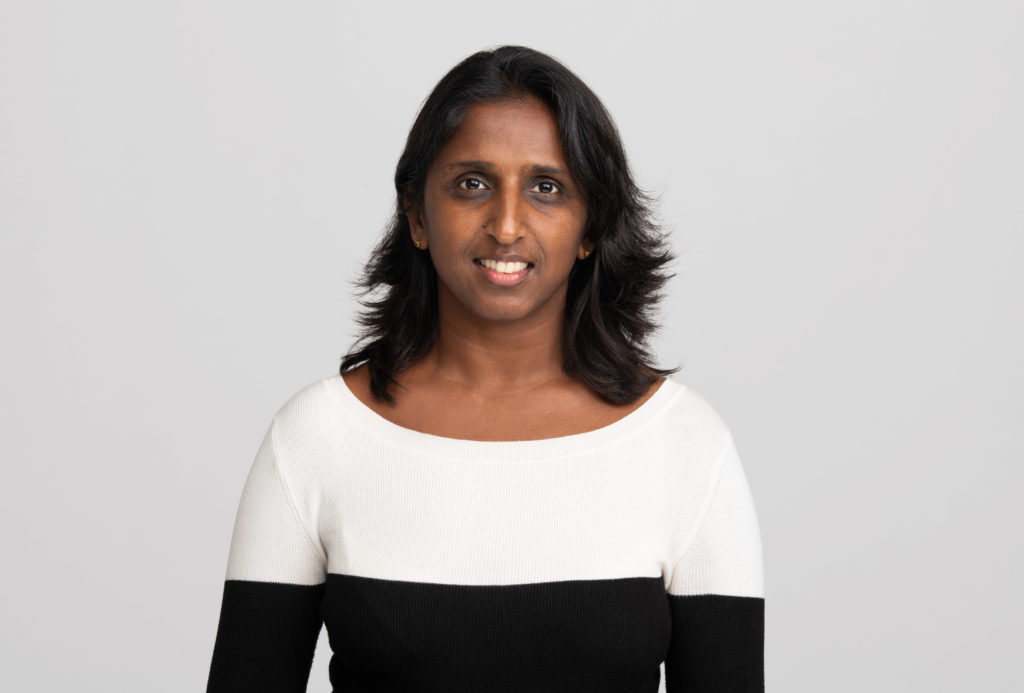In honour of International Women’s Day, and in partnership with the BC Gender Equity Office, I’m sharing Women on the COVID Front Lines, profiles of women in British Columbia working to serve the needs of their communities through the pandemic.
It’s been a long journey for Dr. Charuka Maheswaran to arrive at her current home of Courtenay on Vancouver Island, where she spent 17 years as a general practitioner and is now a public health physician-in-training. Born in Sri Lanka, where her parents endured brutal colonial rule and a bloody civil war that raged throughout most of her young life, Dr. Maheswaran cites her family as lucky to have had the opportunity to emigrate to the United Kingdom. She was, as she describes it, “welcomed and loved in Wales” and still misses the sight of hillsides covered in golden daffodils in the Welsh spring. Eventually she came to British Columbia, where she has lived for nearly a decade. “I know in my soul that this is where I [will] raise my children, grow old and die.” Dr. Maheswaran says. “We immigrants choose the place we want to belong to.”
Dr. Maheswaran approaches her work as a doctor with strength and compassion, perhaps gleaned from so many extraordinary life experiences from a young age. This empathy carries over into her thoughts on the pandemic and its widespread effects on our communities. “COVID-19 has been a lens to show the fractures we already have in our society,” Dr. Maheswaran says, and sees this as a time to “acknowledge the issues, how far we have come, and how much further we need to go to redress the imbalances. [We must] recognise that marginalised peoples are there because of power and structural inequities that will take all of us working together to fix.”
This thoughtfulness is reflected in her career choice too. “Work brings structure to your day and purpose to your life,” she says, “if that work makes someone else’s day a little better too, then you’ve found the thing you should spend your days doing.” Her passion for her career can be seen in the standards to which she holds it. She describes her children as her “world and life”, and thus her job must be worth doing in order for her to be away from them. “If you don’t do something as important or worthwhile as raising your child,” she advises, “then you need to find something else.”
While it’s clear practicing medicine is something of great value to Dr. Maheswaran, her journey has not been without its challenges. Speaking with frank honesty, she describes growing up in the 1980s, when racism was pervasive, and becoming a young woman in the 1990s, when sexism and sexual harassment were commonplace. She has seen a great deal of positive change, albeit slowly, and cites Doctors of BC as an organization very receptive to the evolving medical culture. But she knows a challenging and complex paradigm shift throughout all of society is required to eliminate systemic sexism and racism, embodied in the objectification and othering she stills experiences. “There is [still] an expectation from medical colleagues, other health professionals and patients, of what a doctor should look like and how they should be and behave,” Dr. Maheswaran says.
Dr. Maheswaran has observed these deeply embedded systems and their effects throughout the pandemic. She notes the increase of divorces resulting from lockdowns, as women see how much they do in comparison for tasks that should be shared in the home, and a disheartening increase in intimate partner violence. She hopes one positive outcome of the pandemic might be an acknowledgement of the pervasiveness of domestic violence, with an accompanying movement to spark conversation and action in families and throughout society.
As a woman of colour working in a male-dominated field, Dr. Maheswaran’s career has not been without its challenges, but she remains optimistic about the progress she’s seen. “Of course I have experienced racism and sexism, and that special brand of both—misogynoir—faced by women of colour,” she says, “but I know this is more than my grandmother and beloved aunt ever dreamed for me. I am my ancestors’ wildest dreams and most daring hope, and for that I am humbly grateful.” Dr. Maheswaran sees this same hope in her own daughter and a young generation of shifting attitudes and open minds, and she is heartened by what she is witnessing. “Once freedoms and equalities are achieved,” Dr. Maheswaran says, “they’re hard to push back.” With COVID-19 having proved our world can shift in ways never previously imagined, Dr. Maheswaran’s wildest dreams for her own children feel more possible than ever.


